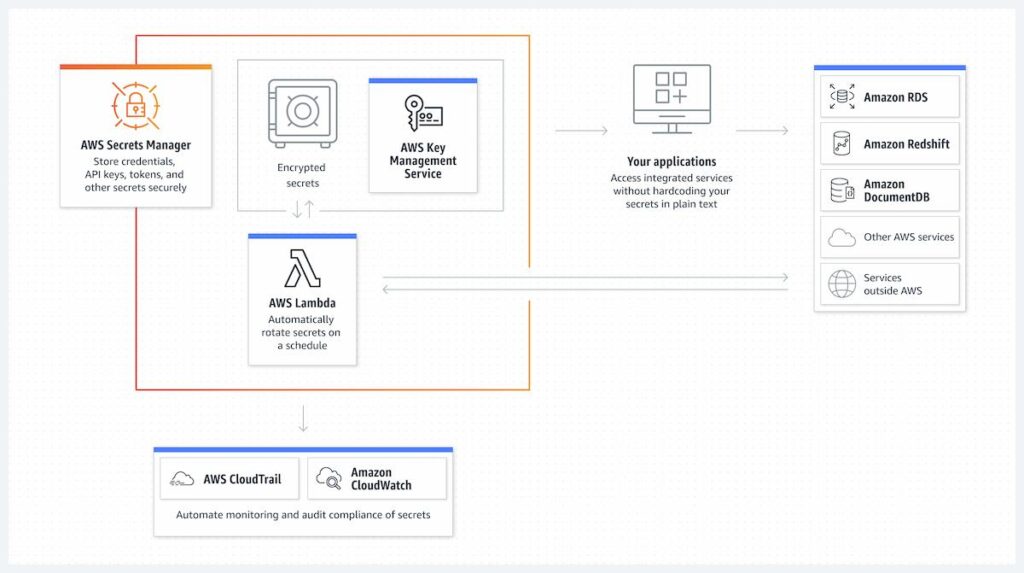Are you looking for a secret weapon to secure and scale your applications? Look no further than AWS Secrets Manager. In today’s digital age, effectively managing secrets such as API keys, database credentials, and other sensitive information is crucial for maintaining the security and scalability of your applications. AWS Secrets Manager offers a robust and user-friendly solution to help you securely store, access, and manage secrets.
In this guide, we’ll explore the power of AWS Secrets Manager and why it’s essential for modern applications. We’ll dive into its key features, such as automatic rotation of secrets, integration with AWS IAM policies, and its ability to integrate with other AWS services seamlessly. By leveraging these capabilities, you can ensure that your applications are always protected against security breaches while streamlining your secrets’ management.
Table of Contents
Whether you’re a seasoned developer or a business owner looking to enhance the security of your applications, this guide will provide valuable insights on how AWS Secrets Manager can revolutionize your secret management strategy. Don’t miss out on this secret to secure and scalable applications. Read on to unlock its full potential.
What is AWS Secrets Manager?
AWS Secrets Manager is a fully managed service provided by Amazon Web Services designed to secure, manage, and rotate sensitive information such as database credentials, API keys, and other secrets. It’s built to integrate seamlessly with other AWS services, offering a centralized platform to manage access to secrets throughout their lifecycle. The service simplifies the task of securing access to applications, services, and IT resources without the overhead of managing a complex infrastructure for secret management.
By automating the process of rotating, managing, and retrieving secrets, AWS Secrets Manager helps enhance the overall security posture of applications and services running on AWS.

The Importance of Secure and Scalable Applications
In an increasingly interconnected world, the security and scalability of applications have become paramount. With cyber threats on the rise and the need for applications to handle high volumes of traffic, it’s essential to have a reliable system in place to protect sensitive information and ensure that your applications can handle increasing demand.
Security breaches can have severe consequences, ranging from financial loss to reputational damage. By effectively managing secrets, you can minimize the risk of unauthorized access and protect your users’ data. Scalability is equally important as applications must handle increased traffic and user demand without compromising performance.
Key Features and Benefits of AWS Secrets Manager
Automatic Rotation of Secrets
One of the standout features of AWS Secrets Manager is its automatic rotation of secrets. This capability ensures that secrets such as passwords, tokens, and API keys are automatically updated at regular intervals. This automation saves time and significantly reduces the risk of security breaches caused by outdated or compromised credentials. The automatic rotation feature also aligns with security best practices, ensuring that your application’s secrets are always up-to-date and less vulnerable to attacks.
Integration with AWS IAM Policies
AWS Secrets Manager seamlessly integrates with AWS Identity and Access Management (IAM) policies, enhancing the control over who can access your secrets. This integration allows you to define precise access permissions for different users and services, ensuring that only authorized entities can retrieve sensitive information. By leveraging IAM policies, you can enforce the principle of least privilege, ensuring that each user or service has only the permissions necessary to perform its tasks, thereby tightening your security posture.
Seamless Integration with AWS Services
Another significant advantage of AWS Secrets Manager is its ability to integrate effortlessly with various AWS services. Secrets Manager provides a secure and efficient method to access and manage secrets for applications utilizing Amazon RDS, Amazon EC2, AWS Lambda, and other AWS offerings. This integration is key in eliminating the risky practice of hardcoding credentials in your applications. By centralizing secret management, AWS Secrets Manager simplifies credential management and ensures that sensitive information is securely stored and accessed.
Managing Secrets and Credentials in AWS Secrets Manager
With AWS Secrets Manager, you have complete control over managing your secrets and credentials. This includes updating, rotating, and deleting secrets as needed. Secrets Manager also provides visibility into secret usage, allowing you to track who is accessing your secrets and when. This auditability is essential for compliance and can help identify any unauthorized access attempts.
To ensure the security of your secrets, AWS Secrets Manager encrypts all stored secrets using AWS Key Management Service (KMS). This ensures that even if an attacker gains unauthorized access to the underlying storage, they cannot decrypt and retrieve the sensitive information. AWS Secrets Manager also supports customer-managed CMKs, giving you the flexibility to control the encryption keys used to protect your secrets.
Integrating AWS Secrets Manager Into Your Application
Integrating AWS Secrets Manager into your application is a straightforward process. Depending on your programming language and framework, there are different ways to retrieve secrets from Secrets Manager. For example, if you’re using AWS Lambda, you can leverage the Secrets Manager integration directly, allowing your Lambda functions to access the secrets they need securely.
In addition to the native integrations, AWS Secrets Manager also provides a command-line interface (CLI) and SDKs for popular programming languages. This allows you to retrieve secrets programmatically, making incorporating secrets retrieval into your application code easy. By leveraging these integrations, you can ensure that your applications always have access to the necessary secrets without compromising security.
How AWS Secrets Manager Uses AWS KMS
AWS Secrets Manager utilizes AWS Key Management Service (KMS) for encryption, ensuring that the secrets stored are kept secure. Every secret in AWS Secrets Manager is encrypted using encryption keys that you can manage through AWS KMS. This integration provides a robust layer of security, as the encryption keys used are protected by AWS KMS, which is designed to prevent unauthorized access and ensure the highest level of security. AWS KMS allows you to create and manage your own encryption keys, giving you control over who can use these keys to access your secrets. This seamless integration ensures that all secrets stored in AWS Secrets Manager are encrypted and safeguarded effectively.
Best Practices for Using AWS Secrets Manager
Implement Least Privilege Access Control
A fundamental best practice is to restrict access to secrets by using AWS Identity and Access Management (IAM) policies. Granting access based on the principle of least privilege ensures that only necessary users and services have access to specific secrets. This approach significantly reduces the risk of unauthorized access and potential damage from security breaches.
Regular Secret Rotation
Utilize the automatic rotation feature of AWS Secrets Manager to update secrets regularly. This practice is critical in minimizing the risk of exposure to static credentials. Frequent rotation ensures that compromised credentials are invalidated in a timely manner, thus safeguarding your applications against potential threats.
Monitoring and Auditing Access
It’s crucial to monitor and audit who accesses your secrets and when. Monitoring solutions to track access patterns help detect unusual or unauthorized access attempts. Regular audits and reviews of access logs are important to maintain a secure secrets management environment.
Enforce Strong Secret Creation Policies
Ensure that the secrets stored in AWS Secrets Manager adhere to strong creation policies. This means enforcing complexity requirements, such as a minimum length, and including upper-case and lower-case letters, numbers, and special characters for passwords and keys. Stronger secrets are more resistant to brute-force attacks and guessing attempts.
Backup Secrets Regularly
Regularly back up your secrets to safeguard against accidental deletions or loss of access. This can be crucial in scenarios where a quick recovery of a secret is needed to restore service functionality or to maintain business continuity.
Use Multi-Factor Authentication
Enhance security by implementing multi-factor authentication (MFA) for accessing AWS Secrets Manager. MFA adds an additional layer of security by requiring two or more verification methods, significantly reducing the risk of unauthorized access due to compromised credentials.
Segregate Environments
Separate secrets based on environments, such as development, testing, and production. This segregation ensures that actions in one environment do not affect others, and it also helps minimize the risk of accidental changes or exposure of critical production secrets.
Utilize Resource Tagging
Employ resource tagging to organize and manage secrets, especially in complex environments with numerous secrets. Tags can help categorize secrets based on their purpose, ownership, or sensitivity level, making managing access policies and audit trails easier.
How Secret Rotation Works
Secret rotation in AWS Secrets Manager is a process designed to enhance security by automatically changing the secrets at regular intervals. This feature is critical in preventing unauthorized access that can occur through compromised credentials. The rotation process involves creating new versions of the secret while maintaining the ability to access the older versions, ensuring that applications and services using the secret can transition smoothly without downtime. AWS Secrets Manager can be configured to trigger this rotation automatically on a defined schedule, and it can also integrate with AWS services like RDS to automate credential updates in those services, providing a streamlined and secure approach to managing sensitive information.
Comparing AWS Secrets Manager with Other Secrets Management Solutions
While AWS Secrets Manager offers a robust and user-friendly solution for managing secrets, it’s worth comparing it with other secrets management solutions to understand the differences and advantages. One popular alternative is HashiCorp Vault, which provides similar capabilities for managing secrets and credentials. However, AWS Secrets Manager offers tight integration with other AWS services, making it a seamless choice for applications running on the AWS platform.
Another alternative is to build a custom secrets management solution using open-source tools. While this approach provides flexibility, it requires significant development effort and ongoing maintenance. On the other hand, AWS Secrets Manager eliminates the need for custom development and provides a managed service that takes care of the complexities of secret management.
AWS Secrets Manager Compliance
AWS Secrets Manager is designed with compliance in mind, helping organizations meet various regulatory and industry standards. Secrets Manager supports compliance with regulations like GDPR, HIPAA, and PCI-DSS by providing tools to manage and rotate secrets and detailed access logs. The service’s integration with AWS CloudTrail ensures that all interactions with secrets, such as creation, deletion, and rotation events, are recorded and auditable. This detailed tracking and control level is crucial for organizations that must adhere to strict security and compliance requirements in their cloud environments.
Conclusion: Harnessing the Power of AWS Secrets Manager for Secure and Scalable Applications
In conclusion, AWS Secrets Manager is a powerful tool for managing secrets and credentials in your applications. With its automatic rotation feature, integration with AWS IAM policies, and seamless integration with other AWS services, Secrets Manager provides a comprehensive solution for secure and scalable applications. By following best practices and leveraging the capabilities of AWS Secrets Manager, you can ensure that your applications are protected against security breaches and can handle increasing demand. Don’t miss out on the secret to secure and scalable applications. Unlock the full potential of AWS Secrets Manager today.






